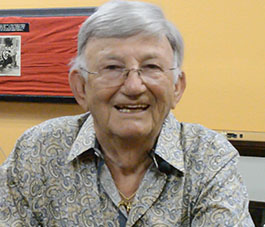When someone has “put you through hell” it’s often hard to forgive. But Holocaust survivor David Kaplan, who spent four years in a concentration camp, has made forgiving Hitler and the Nazis look easy.
“I stop, I relax and then I don’t hate them anymore,” Kaplan, 88, said recently in an emotional interview at the El Paso Holocaust Museum and Study Center.
Born on July 20, 1928 in Kaunas, Lithuania, the retired businessman is one of about 35 Holocaust survivors who settled in El Paso after the Second World War and one of just a few still alive in El Paso. When the Nazis and Adolph Hitler rose to power in Germany when he was a child in Lithuania, he and his parents and siblings were forced to move into a small house in the Slobodka Ghetto.
“We had to move to a small town… a section where all the Jewish people had to live,” he said.
Soon after, the authorities shut down the family’s clothing shop and obtaining food and money became a daily struggle.
“ There was not enough food. We had very little money and everything… started to go downhill from there,” Kaplan said.
The family was then moved to a camp in Lithuania, where Kaplan survived by working as a shoe maker. It was here he witnessed one of many atrocities. He said one day a group of Nazi soldiers arrived and removed all the children who weren’t working. At the end of the day, when the parents returned to their bunkers they were shocked to find their children gone.
“They took everyone except me,” Kaplan recalled. “Then the parents came back from work and didn’t find their children…and some of them threw themselves against the electric wall and they got electrocuted… This was the worst day of my life; this was the first time I survived this disaster.”
Eventually he and family were forced to board a train through Poland for resettlement in other concentration camps. His sister and his mother were sent to Majdanek. Kaplan and a brother were sent to the Dachau. He was about 14 at the time.
Over the next four years, Kaplan would survive other devastating events inside the camp, such as a death march toward as World War II was ending and thousands of starving, shoeless prisoners were marched from Dachau toward the Swiss border. Before arriving at their destination, U.S. soldiers arrived and liberated Kaplan and the other prisoners. It was then, Kaplan said, that he decided then to forgive everyone who did wrong to me.

David Kaplan
“To forgive is one of the best things you could ever do in your life,” he said. “By forgiving someone who did something wrong to you, you live a nicer life.”
Kaplan, who wears silver glasses and a gold lion on a chain around his neck, explained that it gives him pleasure to know that he has been able to let go of the past. He provided an example.
“A guy you don’t like walks into a room. You’re having fun and you see him and all your fun is just spoiled because you don’t like to look at him. But when you forgive somebody and the same guy walks in you already forgave him and you look at him and say ‘Heyyyy, how are you?’ You know, you forgave him already; you don’t have to worry about anything. It’s nice.”
He added: “My best professor… was an ex-Nazi. It was so nice for me to forgive him, even before I met him!”
To share his story more broadly Kaplan has self published an autobiography titled, “I Forgive Them.” In it he recounts his childhood, his experiences in the camp and his survival.
“ I wanted so much to stay alive that somehow I managed. There were many obstacles. It was so easy for me to die… but I survived.”
